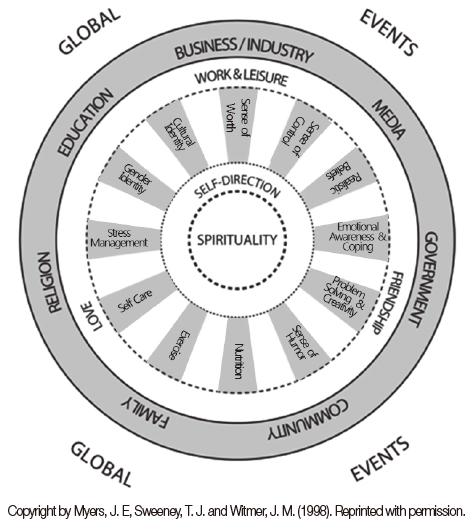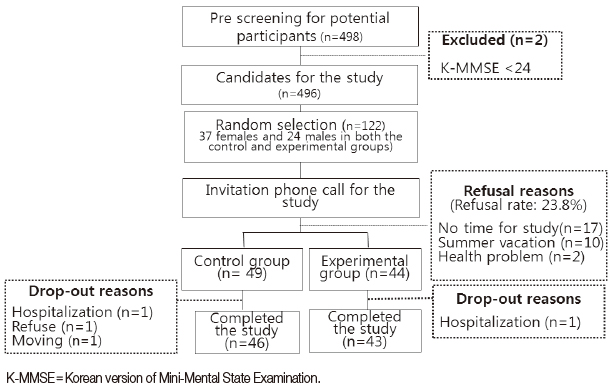J Korean Acad Nurs.
2015 Jun;45(3):459-468. 10.4040/jkan.2015.45.3.459.
Wheel of Wellness Counseling in Community Dwelling, Korean Elders: A Randomized, Controlled Trial
- Affiliations
-
- 1College of Nursing, Kyungpook National University, Deagu, Korea. sh235@knu.ac.kr
- 2The Research Institute of Nursing Science, Kyungpook National University, Deagu, Korea.
- KMID: 2164387
- DOI: http://doi.org/10.4040/jkan.2015.45.3.459
Abstract
- PURPOSE
The purpose of this study was to investigate the effects of Wheel of Wellness counseling on wellness lifestyle, depression, and health-related quality of life in community dwelling elderly people.
METHODS
A parallel, randomized controlled, open label, trial was conducted. Ninety-three elderly people in a senior welfare center were randomly assigned to two groups: 1) A Wheel of Wellness counseling intervention group (n=49) and 2) a no-treatment control group (n=44). Wheel of Wellness counseling consisted of structured, individual counseling based on the Wheel of Wellness model and provided once a week for four weeks. Wellness lifestyle, depression, and health-related quality of life were assessed pre-and post-test in both groups.
RESULTS
Data from 89 participants were analyzed. For participants in the experimental group, there was a significant improvement on all of the wellness-lifestyle subtasks except realistic beliefs. Perceived wellness and depression significantly improved after the in the experimental group (n=43) compared to the control group (n=46) from pre- to post-test in the areas of sense of control (p=.033), nutrition (p=.017), exercise (p=.039), self-care (p <.001), stress management (p=.017), work (p=.011), perceived wellness (p=.019), and depression (p=.031). One participant in the intervention group discontinued the intervention due to hospitalization and three in the control group discontinued the sessions.
CONCLUSION
Wheel of Wellness counseling was beneficial in enhancing wellness for the community-dwelling elderly people. Research into long-term effects of the intervention and health outcomes is recommended.
MeSH Terms
Figure
Reference
-
1. Kim H, Traphagan JW. From socially weak to potential consumer: Changing discourses on elder status in South Korea. Care Manag J. 2009; 10(1):32–39.2. Lee MS. Structures of health inequalities of Korean elderly: Analysis of Korean longitudinal study of ageing. Health Soc Sci. 2009; 25:5–32.3. Statistics Korea. 2012 annual report on the causes of death statistics [Internet]. Daejeon: Author;2013. cited 2014 January 20. Available from: http://kostat.go.kr/portal/korea/kor_nw/2/6/2/index.board?bmode=read&bSeq=&aSeq=308559&pageNo=1&rowNum=10&navCount=10&currPg=&sTarget=title&sTxt=.4. Helliwell JF, Putnam RD. The social context of well-being. Philos Trans R Soc Lond B Biol Sci. 2004; 359(1449):1435–1446. DOI: 10.1098/rstb.2004.1522.5. Shin KM, Cho SM, Hong CH, Park KS, Shin YM, Lim KY, et al. Suicide among the elderly and associated factors in South Korea. Aging Ment Health. 2013; 17(1):109–114.6. Lerner D, Rodday AM, Cohen JT, Rogers WH. A systematic review of the evidence concerning the economic impact of employee-focused health promotion and wellness programs. J Occup Environ Med. 2013; 55(2):209–222. DOI: 10.1097/JOM.0b013e3182728d3c.7. Phillips JF. Using an ounce of prevention: Does it reduce health care expenditures and reap pounds of profits? A study of the financial impact of wellness and health risk screening programs. J Health Care Finance. 2009; 36(2):1–12.8. Boston RB, Clifford BM. Laws affecting wellness programs and some things they make you do. Employee Relat Law J. 2013; 39(1):30–34.9. Avery G, Johnson T, Cousins M, Hamilton B. The school wellness nurse: A model for bridging gaps in school wellness programs. Pediatr Nurs. 2013; 39(1):13–18.10. Chen IJ, Chou CL, Yu S, Cheng SP. Health services utilization and cost utility analysis of a walking program for residential community elderly. Nurs Econ. 2008; 26(4):263–269.11. Lee TW, Ko IS, Lee KJ. Health promotion behaviors and quality of life among community-dwelling elderly in Korea: A cross-sectional survey. Int J Nurs Stud. 2006; 43(3):293–300. DOI: 10.1016/j.ijnurstu.2005.06.009.12. Choi CY, Cho HC. The effect of degree of senior exercise participation on wellness. J Korea Soc Wellness. 2012; 7(3):13–21.13. Hatch J, Lusardi MM. Impact of participation in a wellness program on functional status and falls among aging adults in an assisted living setting. J Geriatr Phys Ther. 2010; 33(2):71–77.14. Roscoe LJ. Wellness: A review of theory and measurement for counselors. J Couns Dev. 2009; 87(2):216–226.15. Myers JE, Sweeney TJ, Witmer M. The wheel of wellness counseling for wellness: A holistic model for treatment planning. J Couns Dev. 2000; 78(3):251–266.16. Myers JE, Sweeney TJ. Wellness counseling: The evidence base for practice. J Couns Dev. 2008; 86(4):482–493. DOI: 10.1002/j.1556-6678.2008.tb00536.x.17. Tanigoshi H, Kontos AP, Remley TP Jr. The effectiveness of individual wellness counseling on the wellness of law enforcement officers. J Couns Dev. 2011; 86(1):64–74. DOI: 10.1002/j.1556-6678.2008.tb00627.x.18. Kang Y, Na DL, Hahn S. A validity study on the Korean minimental state examination (K-MMSE) in dementia patients. J Korean Neurol Assoc. 1997; 15(2):300–308.19. Cohen J. Statistical power analysis for the behavioral sciences. 2nd ed. Hillsdale, NJ: Lawrence Erlbaum Associates;1988.20. Faul F, Erdfelder E, Lang AG, Buchner A. G*Power 3: A flexible statistical power analysis program for the social, behavioral, and biomedical sciences. Behav Res Methods. 2007; 39(2):175–191.21. Myers JE, Sweeney TJ. Counseling for wellness: Theory, research, and practice. Alexandria, VA: American Counseling Association;1998.22. Donnelly PL, Kim KS. The patient health questionnaire (PHQ-9K) to screen for depressive disorders among immigrant Korean American elderly. J Cult Divers. 2008; 15(1):24–29.23. Kroenke K, Spitzer RL, Williams JB. The PHQ-9: Validity of a brief depression severity measure. J Gen Intern Med. 2001; 16(9):606–613.24. Hattie JA, Myers JE, Sweeney TJ. A factor structure of wellness: Theory, assessment, analysis, and practice. J Couns Dev. 2004; 82(3):354–364. DOI: 10.1002/j.1556-6678.2004.tb00321.x.25. Villalba JA, Myers JE. Effectiveness of wellness-based classroom guidance in elementary school settings: A pilot study. J Sch Couns. 2008; 6(9):1–31.26. Lee DG, Park HJ. Cross-cultural validity of the frost multidimensional perfectionism scale in Korea. Couns Psychol. 2011; 39(2):320–345. DOI: 10.1177/0011000010365910.27. Ashbaugh A, Antony MM, Liss A, Summerfeldt LJ, McCabe RE, Swinson RP. Changes in perfectionism following cognitive-behavioral treatment for social phobia. Depress Anxiety. 2007; 24(3):169–177. DOI: 10.1002/da.20219.28. Clifford A, Rahardjo TB, Bandelow S, Hogervorst E. A cross-sectional study of physical activity and health-related quality of life in an elderly Indonesian cohort. Br J Occup Ther. 2014; 77(9):451–456. DOI: 10.4276/030802214X14098207541036.29. Kim JI. Levels of health-related quality of life (EQ-5D) and its related factors among vulnerable elders receiving home visiting health care services in some rural areas. J Korean Acad Community Health Nurs. 2013; 24(1):99–109. DOI: 10.12799/jkachn.2013.24.1.99.30. Fotoukian Z, Shahboulaghi FM, Khoshknab MF, Mohammadi E. Concept analysis of empowerment in old people with chronic diseases using a hybrid model. Asian Nurs Res (Korean Soc Nurs Sci). 2014; 8(2):118–127. DOI: 10.1016/j.anr.2014.04.002.
- Full Text Links
- Actions
-
Cited
- CITED
-
- Close
- Share
- Similar articles
-
- Factors Influencing Ego-Integrity in Community Dwelling Elders
- The Effects of Home Visit Healthcare Using a Complex Program on Community-dwelling Frail Elders' Strength, Frailty, and Depression
- The Effects of a Cognitive Enhancement Group Training Program for Community-dwelling Elders
- Fear of Falling, Depression, Physical Fitness and Physical Activity among Community Dwelling Elders
- Effects of Auricular Acupressure Therapy on Psychological Factors, Sleep Quality, and Salivary Cortisol Levels in South Korean Older Adults in the Community: A Single-blind, Randomized Controlled Trial



